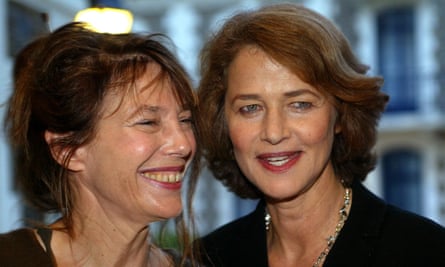Jane and I were contemporaries. Born the same year in 1946. Me in February, she in December. We had the same kind of upbringing too – her mother was an actress, mine an artist, and we both had military fathers. And we were just pretty girls living in London in the 60s with all those 60s changes flooding in, the 60s dream, being spotted and brought into films, enjoying free love and all the new ideas for our creative expression. We were suddenly so much freer than our parents who were just bemused by it all. But there was no stopping us, the world was ours for those few years.
Our first film was the same one, Richard Lester’s The Knack… and How to Get It (1965). We had a scene standing on the stairs together, but we just sort of bumped into each other there – no friendship then as such. I identified with Jane more after we had both landed in France, me much later than her, after I married [in 1978, to her second husband, musician Jean-Michel Jarre]. We’d bump into each other around town and at functions, and I’d often go to Jane’s shows. I liked that we were the English girls in Paris – the French couldn’t really understand us in the same way. And even though Jane and I weren’t in the same social groups – our husbands played very different music and we were both quite private people – we recognised that we were going along similar paths, parallel lives.
Through the years, we’d send messages to each other, even before texts, and we had friendly little conversations. I remember her saying she’d named Charlotte [her daughter with Serge Gainsbourg] after me because she loved the way I was. Jane had great sweetness. She was very much a public figure in France, but she was always very humble about it. She’d say she was lucky, that other people were leading with her dancing along behind. This wasn’t false modesty either. When wechatted, you saw she really believed she’d been given this great gift of being part of a powerful, creative world.
She kept that image of herself as a beautiful baby doll with Serge [Gainsbourg, her partner from 1968 to 1980] writing songs for her and she acted during that time in popular comedy films in France as those qualities were also part of her personality. She was very open about her emotional state and the way she felt about things, very free in the way she wanted people to get who she was. She had no interest in saying or doing the cool thing, which was very disarming in Paris. She remained so British, never trying to get rid of that lovely accent. Whatever film she did, including when she moved on to edgier films (with French director Jacques Doillon, her partner after Serge), she put herself fully in the role, making it different, special, unusual. I always loved her smile. Jane wanted to be truthful to Jane in her body, mind and soul, she never pretended to be anyone else.
She was also a very kind people person, like her daughter Kate, so political and committed to social causes and charities, needing to be active, always looking out for others. She could also be a very private person like me – she had a house in the country, and loved being there with her family around her – but after the tragedy of losing Kate, her first child [in 2013], she didn’t work for two years. She was tempted back when the Symphony Orchestra of Montreal asked her to perform Serge’s songs for the 25th anniversary of his death and she then toured with different symphony orchestras around the world for two years. Serge was a classical musician at heart and in a way, Jane was able to honour this.
We had a wonderful 48 hours together in 2015 at a literary festival with William Blake’s poetry. We rehearsed in her home, she worked intensely at everything she did, never resting, always on the move as if she felt she never had enough time to make everything perfect.
Jane was a fine writer of diaries, songs, plays and films. Her last album, Oh! Pardon Tu Dormais (Sorry, You Were Sleeping, 2020), took the title of the play that she had written and performed in years before. In this album she wrote all her own lyrics, delving deep into the truth of the powerful emotions that still haunted her, saying in song what she needed to be heard before she went.
Jane had been unwell for a long time, but she never stopped wanting to find expression. She kept pushing herself to the limit, however she was feeling, always there performing for those who loved her.
She had an extraordinary sense of survival right up until the end.
We met by chance at the Paris Opera just before she died, bumping into each other in the big foyer of the Palais Garnier and we had our last friendly chat. Ours was the kind of friendship where you hold the person in your esteem and your heart, you’re going along the same road, parallel lives, you bump into each other now and again, you chat then move on but you are always watching out quietly for each other. Jane B and Charlotte R.

